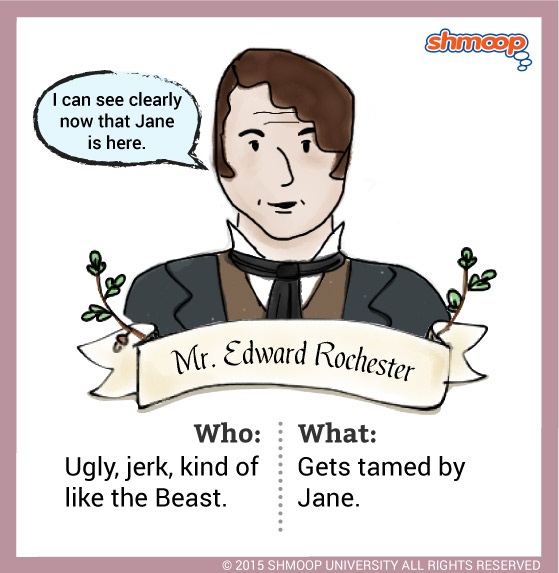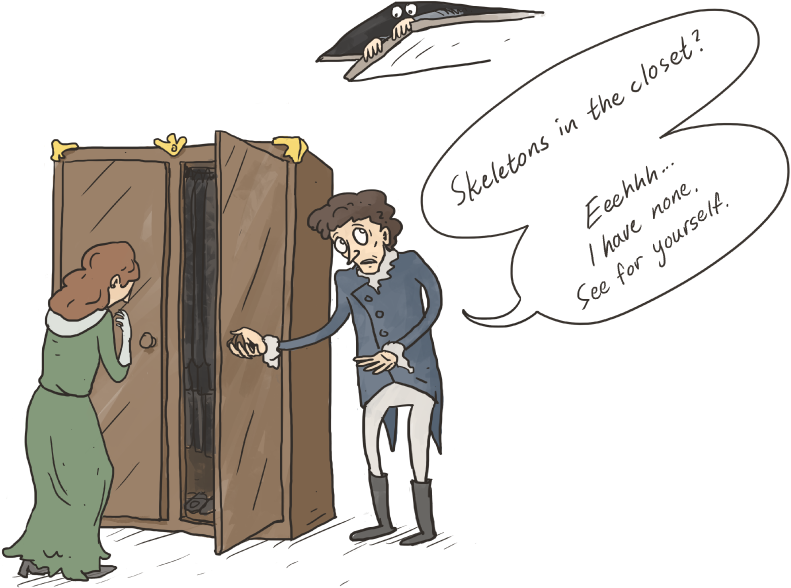Character Analysis

(Click the character infographic to download.)
Mr. Rochester is stern-featured, heavy-browed, craggy-faced, rude, abrupt, horny, twice Jane’s age, always on the edge of violence, likes to order people around, keeps his wife locked in the attic, and teases Jane on at least one occasion until she cries.
Here’s the crazy part: that’s why he’s so awesome.
He may be fantastically ugly. He may be kind of a jerk. But he’s real! Well, okay, he’s not real. He’s a character in Jane Eyre. But you know what we’re talking about; he’s a genuine-seeming character, not some stuck-up, pompous, handsome young man who smoothly says all the proper things and doesn’t have any personality of his own. This novel isn’t about proper behavior; it’s about passion.
Tale as Old as Time
Rochester is sort of like the Beast half of a "Beauty and the Beast" story. (Forget for a minute that Jane’s no beauty.) He’s even got a sort of shaggy mane of hair that makes him look beast-ish, and at the end of the novel, when he’s locked himself away at Ferndean to wallow in his own self-pity, he’s described as "some wronged and fettered wild beast or bird, dangerous to approach in his sullen woe" (3.11.9).
Of course, if Rochester is the Beast, then Jane will have to do something to tame him. Instead of subduing him once and for all, she develops little ways of manipulating him—making him irritated when he’s horny so that he curses her instead of hitting on her, for example, when they’re engaged for the first time:
In other people’s presence I was, as formerly, deferential and quiet; any other line of conduct being uncalled for: it was only in the evening conferences I thus thwarted and afflicted him. He continued to send for me punctually the moment the clock struck seven; though when I appeared before him now, he had no such honeyed terms as "love" and "darling" on his lips: the best words at my service were "provoking puppet," "malicious elf," "sprite," "changeling," &c. For caresses, too, I now got grimaces; for a pressure of the hand, a pinch on the arm; for a kiss on the cheek, a severe tweak of the ear. It was all right: at present I decidedly preferred these fierce favours to anything more tender. […] Meantime, Mr. Rochester affirmed I was wearing him to skin and bone, and threatened awful vengeance for my present conduct at some period fast coming. I laughed in my sleeve at his menaces. "I can keep you in reasonable check now," I reflected; "and I don’t doubt to be able to do it hereafter: if one expedient loses its virtue, another must be devised."
Yet after all my task was not an easy one; often I would rather have pleased than teased him. (2.9.171-172)
There’s more danger than anything else in these strange evening dates. At points the reader is just a little bit nervous that Rochester’s a bit too wild or a bit too incapable of restraining his desires. We’re admittedly a little afraid for what might happen to Jane at some of those moments when he wildly clasps her to him.
Perhaps that’s one reason Rochester gets compared in the novel to Bluebeard, the mythical nobleman who gets into a marry-and-murder cycle with one wife after another. There’s also a hint of the Arabian Nights here—in those tales, there's a woman named Scheherazade who has to keep coming up with stories to tell the king so he doesn’t behead her in the morning, like he did to his previous 3,000 wives.
It’s pretty similar to the way Jane has to keep coming up with ways to tease Rochester and draw out his interest from day to day so that he doesn’t… what? Lose interest in her? Lose control and ravish or even rape her? Both of these seem possible at different points in the novel, though Rochester will later claim that he could never have harmed Jane.
We’re not saying this is a healthy relationship... but Jane and Rochester seem to like it. They’re are always playing with the power dynamic between them: Jane likes to call Rochester her "master" and to "serve" him, but it’s also clear that she’s stronger—emotionally and ethically—than he is, and that he (this Beast + Bluebeard + Persian King dude) desperately needs her.
Morals? Ethics? I Have Some of those Around Here Somewhere. Check Under the Sofa Cushions.
Rochester likes to make excuses for himself: he’s not a bad person by nature, he was just in a really bad situation with this whole Bertha thing, what could he do but lock her in the attic and sleep his way across Europe, huh? And what’s he supposed to do now that he can’t get a divorce—just take care of his wife for the rest of her life, considering that he’s got all her money anyway and that he shipped her across the Atlantic away from any friends or family who might have helped her? As if! Bigamy is clearly the only reasonable option, right?
Jane’s different from all the previous women in Rochester’s life because she won’t let him get away with that kind of bogus logic. Rochester’s long, sophisticated (read: BS) explanations of why his particular situation requires a new and different sort of morality don’t convince Jane at all:
[Mr. Rochester:] "[S]ince happiness is irrevocably denied me, I have a right to get pleasure out of life: and I will get it, cost what it may."
[Jane:] "Then you will degenerate still more, sir."
"Possibly: yet why should I, if I can get sweet, fresh pleasure? And I may get it as sweet and fresh as the wild honey the bee gathers on the moor."
"It will sting—it will taste bitter, sir."
"How do you know?—you never tried it. […] I scarcely think the notion that flittered across my brain was an error. I believe it was an inspiration rather than a temptation: it was very genial, very soothing—I know that. Here it comes again! It is no devil, I assure you; or if it be, it has put on the robes of an angel of light. I think I must admit so fair a guest when it asks entrance to my heart." (1.14.65-71)
Rochester makes two assumptions about ethics here that are different from Jane’s: 1) that something must be right and good just because it’s pleasant, and 2) that moral principles are not absolute and unchanging, but relative to one’s situation.
Jane doesn’t know what he’s thinking at this point, but we do: that it couldn’t be wrong for him to get romantically involved with her, because he doesn’t really have any existing romance in his life and dating Jane would be great. Jane may not be convinced, but perhaps the reader is, just a little bit.
We’re always willing to overlook some of Rochester’s more glaring flaws in order to indulge the passion he and Jane share. That’s one of the strange things about Jane Eyre being a novel with a moralistic side: although Jane always draws a line in the sand and upholds her principles, even the ethically strict Victorian reader might start to see why Rochester’s claims for moral relativity make some sense.
After all, he did really get shafted by his father and brother when he was young and they tricked him into marrying Bertha.

Blinded By Love (and a House Fire)
It’s not surprising that Rochester is injured in the fire that destroys Thornfield Hall, but perhaps it is a little strange that one of his injuries is blindness. With one eye gouged out and the other inflamed, Rochester is uglier than ever, and now he can’t see.
We’d like to be able to say that he can see—he "sees the error of his ways"—and that's sort of true. At least, Rochester claims that he gets it:
I did wrong: I would have sullied my innocent flower—breathed guilt on its purity: the Omnipotent snatched it from me. [...] Divine justice pursued its course; disasters came thick on me: I was forced to pass through the valley of the shadow of death. His chastisements are mighty; and one smote me which has humbled me for ever. You know I was proud of my strength: but what is it now, when I must give it over to foreign guidance, as a child does its weakness? Of late, Jane—only—only of late—I began to see and acknowledge the hand of God in my doom. I began to experience remorse, repentance; the wish for reconcilement to my Maker. I began sometimes to pray: very brief prayers they were, but very sincere. (3.11.248)
What Rochester seems to understand is that his attempt at bigamy would have negatively impacted Jane ("sullied my innocent flower"). He doesn't think that it negatively impacts him in a moral sense, but at least it’s a start.
In literature, there’s more to blindness than meets the eye. (Sorry for that one; we couldn’t resist.) You may know the legend of Odin, the king of the Norse gods, who traded one of his eyes in exchange for wisdom. Or maybe you know about Tiresias, a Greek prophet who supposedly became blind but gained "inner sight." What we’re trying to say is that there’s a long mythological and literary tradition of exchanging physical sight for metaphorical sight, and Rochester’s blindness alludes to that tradition. It’s not a perfect parallel, though; Rochester seems more depressed than enlightened.
So what does it mean that Rochester gets his sense of sight back two years after he marries Jane? Perhaps whatever wisdom he gained while dealing with their bad breakup disappears, too, and he goes back to feeling entitled to pleasure and happiness. Perhaps it just means that we need to have miracles at the end of a romance in order to really feel like we’re getting that classic happy ending.